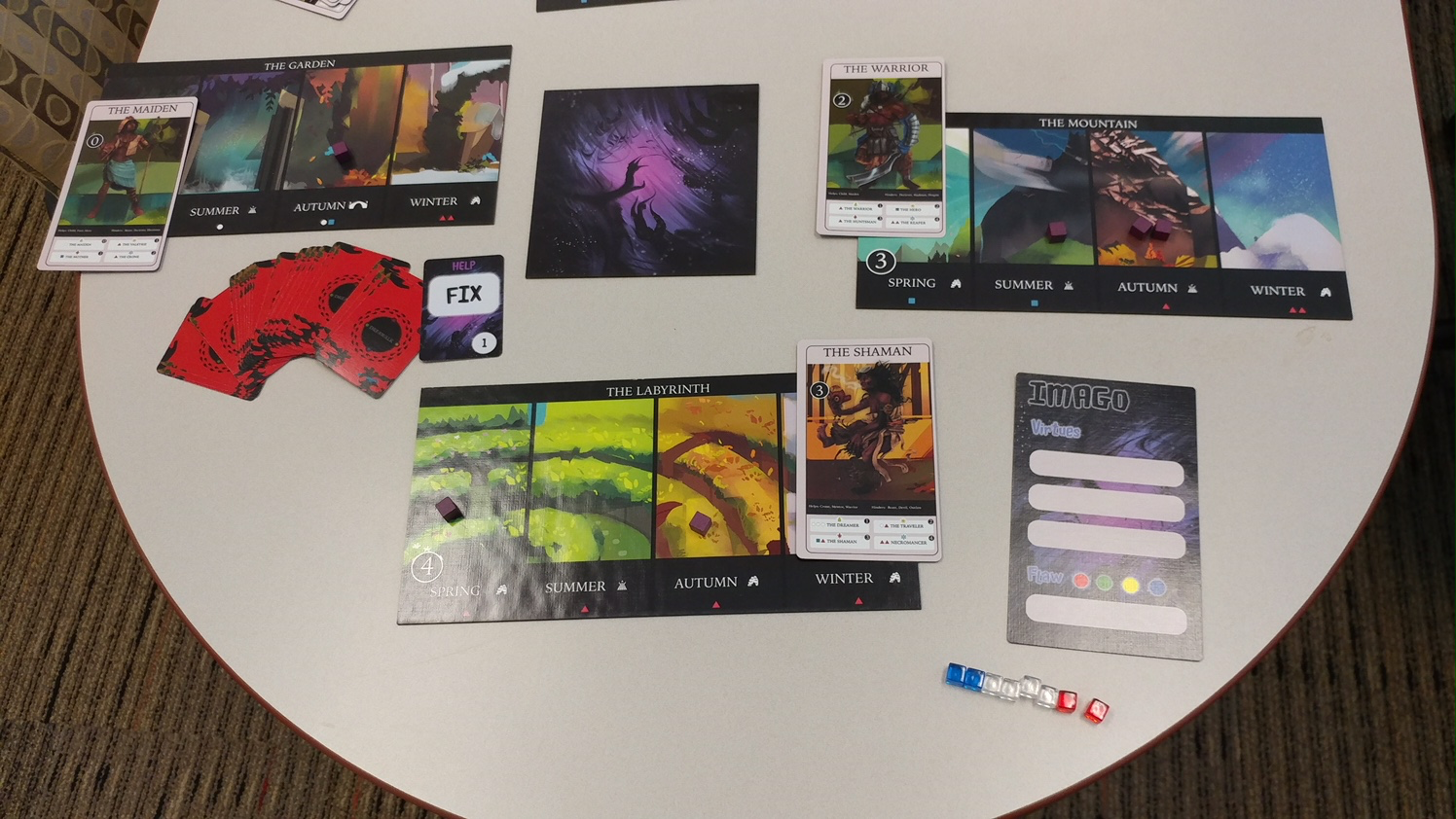Game Information
| Title | DreamWalk |
| Presenter(s) | Allen Turner, Doris Carmen Rusch |
| Session | Conference Reception, Game Exhibition, and Poster Session |
| Time | Thursday, October 11, 7:00p-10:00p |
| Location | MSU Union Ballroom |
| Format | Game Exhibition |
| Screenshot |  |
| Description | DreamWalk - a Mythical, Storytelling, Role-Playing Game
DreamWalk is a game of personal exploration through storytelling and mythmaking. It is a table top adventure game that waits for player participation to form its narrative definition. We designed processes and rituals to help players to get into the proper mindset for engaging the deeper play loop of the game. The game is made of the following parts. 1. Character Creation The first part is the players' part. It is the creation of a self that will navigate and explore the Dreamspace. In making avatars, or dream self, players have to identify important pieces of themselves which we call virtues. These virtues are narrative elements that are the inventory of tools that they bring into Dream with them. Each player identifies three virtues which will be used to help them engage the narratives that arise in play. Players also identify a flaw. This flaw represents the constant struggle and the part of themselves that causes not only trouble for others, but also for themselves. There is an understanding that it is all the troubles, of all the players, working in unison, that are the destabilizing factors of the Dream that would otherwise be at balance and a source of nourishment. In addition, players all have to manage a resource called Essence. Essence represents the inherent creative ability in everyone. It presumes that no one is mundane and that we all have a magical spark. Care must be taken to ensure that the spark doesn't take us towards madness or allow us to turtle into extreme comfort spaces of bliss. Essence is consumed, generated and transformed as the player interacts with the places and denizens of Dream. When a player's Essence falls out of balance (too much madness or too much bliss) they disappear from dream and have to tell stories to their companions that allow them to re-enter the Dream. 2. Exploring Dream-space / Game-space The second part of the game is the Dream itself. The Dream is comprised of The Maelstrom, which lies at the heart of Dream, generating troubles which creep out into the world. The Havens, which are locations in Dream that represent archetypal ideals of nourishment and growth; places where learning and transformation can happen. Lastly there are the Dwellers who represent all sort of archetypal personifications. The Dwellers have interactions and needs in relation to each other, representing collaborating or conflicting inner forces. As the player meets and interacts with the Dwellers, the Dweller's present trials to the player - i.e. the Self striving towards fulfilling of its potential expressed through building and meaningfully transforming its Essence. The trial is presented in the form of a card that suggests it is about helping or hindering another Dweller. On the card is one word, an action verb like "love", or "take" or "guard", that sets the nature of the interaction. The player's role in dream is to meet the Dwellers, project their own ideas onto the dwellers to give them identity and then describe the story of the interaction and what trial is at hand. The players create myth where they must alternately claim the roles of protagonists and perpetrators. They then support or challenge each other to overcome the challenge or add to the narrative of the challenge. Success brings the players closer to overcoming their own flaws, which allows them to all, eventually, descend into the Maelstrom and tame it once they've turned their own flaws into virtues. The taming of the Maelstrom and bringing balance to Dream is the endgame, representing the integrative nature of living your authentic self and coming to terms with existential struggles. 3. The Scribe Because of the introspective nature of the storytelling process, the players don't do all of this alone. The game requires an extra player, the Scribe, whose role is to ask the players what they're doing, why they're doing it, what they find in the Dwellers, what they perceive the Dwellers needs to be, and how those needs speak to each other. The Scribe also tends to the troubles that are spilling into the world from the Maelstrom, which players must also manage else they overwhelm the Havens. If a Haven is overwhelmed with troubles it is lost to Maelstrom. If enough Havens are lost, the Maelstrom is empowered to swallow everything. This, too, ends the game. |
